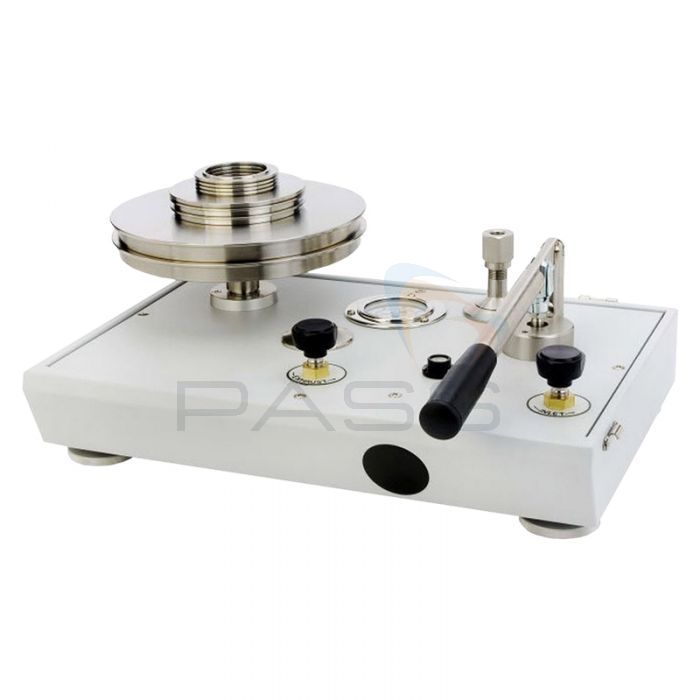Fluke P3014-P Gas Deadweight Tester – With Pump

- Available in five models
- Optimised for calibrating pressure sensing instruments
- Practical, easy-to-transport design
The Fluke P3014-P Gas Deadweight Tester – With Pump is available in five variations with differing pressure ranges and measuring units. All these models have been optimised to calibrate pressure sensing instruments and can be used to check transducers, transmitters, gauges and pressure switches. For further information regarding the differences between these models, please see the table below.
| Product Code | Product Name | Pressure Range |
| P3014-BAR-P | Fluke P3014-BAR-P Gas Deadweight Tester 10 bar with Pump | 0.2 to 10 bar |
| P3014-KGCM2-P | Fluke P3014-KGCM2-P Gas Deadweight Tester 10 kgf/cm2 with Pump | 0.2 to 10 kgf/cm² |
| P3014-PSI-P | Fluke P3014-PSI-P Gas Deadweight Tester 150 psi with Pump | 3 to 150 psi |
| P3014-KPA-P | Fluke P3014-KPA-P Gas Deadweight Tester 1000 kPa with Pump | 20 to 1,000 kPa |
| P3014-MPA-P | Fluke P3014-MPA-p Gas Deadweight Tester 1MPa with Pump | 0.02 to 1 MPa |
The Fluke P3014-P Gas Deadweight Tester includes an integrated hand pump allowing the user to create up to 300psi (20 bar) of pneumatic pressure. Alternatively, the user can connect an external gas source to the /NPT female external supply to create the necessary pressure. In order to create the exact pressure required, the Fluke P3014-P Gas Deadweight Tester includes a high-quality needle for fine adjustments.
Precision is at the forefront of this product’s design; it has a standard accuracy of 0.015% which can be improved to 0.008%. In order to achieve this, the Fluke P3014-P Gas Deadweight Tester may be calibrated with regards to the user’s local gravity, ensuring that the effect of this force on the weight masses is accounted for when performing pressure measurements. Unless otherwise specified the Fluke P3014-P Gas Deadweight Tester will be calibrated to standard gravity, 980.665 cm/s².
Furthermore, the Fluke P3014-P Gas Deadweight Tester is supplied with an ISO 17025 accredited calibration certificate. In addition to this, the piston and cylinder assembly with a floatation indicator has been manufactured to the highest standards and as such has certified accuracies traceable to international standard laboratories, such as NIST (National Institute of Standards and Technology). The piston/ cylinder assembly has been designed to reduce the effects of distortion and thermal coefficients whilst ensuring stability and durability.
Once pressure has been generated, the user adds weight masses to the piston in order to balance the upward force causing the piston and assembly to rise. In order to determine the final pressure, he/she calculates the sum of the nominal pressure values marked on each of the weight masses. For further information regarding this method, please see the video below.
The weight masses supplied with this tester are constructed from series 3 non-magnetic austenitic stainless steel and, as indicated above, are inscribed with the nominal pressure value relative to the high- or low-pressure piston. The instrument’s serial number is also inscribed on these weight masses. They are stored in a robust weight box with a secure locking mechanism, ensuring that they can be easily and safely transported between worksites.
Also adding to the ease of transportation of this tester is its removable lid. Moreover, The Fluke P3014-P Gas Deadweight Tester’s mounted spirit level and adjustable feet mean that it can be set up in a variety of environments without compromising its accuracy. Furthermore, the test station design of this calibrator, the inclusion of O-rings and the supplied 1/8, 1/4, 3/8, 1/2 NPT and BSP adapters and M20 and M14 metric adapters, also add to the ease of this product’s setup; as a result PTFE tape and wrenches are not required when adding additional modules to this tester. The Fluke P3014-P Gas Deadweight Tester is also supplied with spare seals.
The combination of this product’s design and accurate measurement capabilities make the Fluke P3014-P Gas Deadweight Tester- With Pump a practical, precise calibrator ideal for checking a wide variety of pressure sensing instruments.
Fluke P3014-P Gas Deadweight Tester – With Pump Key Features
- Optimised for calibrating a wide variety of pressure sensing instruments
- Ideal for calibrating transducers, transmitters, gauges and pressure switches
- Available in five variations with differing pressure ranges and measurement units
- The integrated hand pump can be used to generate pneumatic pressure up to 300psi (20 bar)
- Alternatively, the user can connect an external gas source to the /NPT female external supply
- High-quality needle for fine pressure adjustments
- Standard accuracy of 0.015% which can be improved to 0.008%
- Calibrated to standard gravity (980.665 cm/s²)
- Option to calibrate the tester to local gravity
- Supplied with an ISO 17025 accredited calibration certificate
- Piston and cylinder assembly includes a floatation indicator
- Piston/cylinder assembly has been manufactured to the highest standards
- Piston/cylinder assembly has certified accuracies traceable to international standard laboratories (NIST)
- Piston/cylinder assembly has been optimised for stability and durability and to lower the effects of distortion and thermal coefficients
- Generated pressure causes the piston/cylinder assembly to rise
- The upward force is counter-balanced by adding accurately calibrated weight masses
- Final pressure is determined by adding together the nominal pressure values on the weight masses
- Weight masses are constructed from series 3 non-magnetic austenitic stainless steel
- Weight masses are marked with the instrument’s serial number
- Weight masses are inscribed with the nominal pressure value relative to the high- or low-pressure piston
- Weight masses are stored in a robust weight box with a secure locking mechanism
- Removable lid supplied
- Mounted spirit level
- Adjustable feet
- Test station design
- O-rings
- Supplied with 1/8, 1/4, 3/8, 1/2 NPT and BSP adapters and M20 and M14 metric adapters
- Supplied with spare seals
- No need for PTFE tape or wrenches when attaching additional modules
- Practical, precise calibrator ideal for checking a variety of pressure sensing instruments
What’s Included?
- Your choice of Fluke P3014-P Gas Deadweight Tester – With Pump
- Weight Masses
- Removable Lid
- ISO 17025 Accredited Calibration Certificate
- Spare Seals
- 1/8, 1/4, 3/8, 1/2 NPT and BSP Adapters
- M20 and M14 Metric Adapters
Offers
 Spend £150+ (Ex VAT) on any qualified Fluke or Beha-Amprobe product(s) and claim a free tool of your choice from the list at Fluke Promotion. Valid February 17 2025 - July 31 2025.
Spend £150+ (Ex VAT) on any qualified Fluke or Beha-Amprobe product(s) and claim a free tool of your choice from the list at Fluke Promotion. Valid February 17 2025 - July 31 2025.
Claims are made direct to Fluke. Terms and conditions apply.
Fluke P3014-P Gas Deadweight Tester – With Pump Technical Specifications
| Accuracy | |
| Accuracy | ±0.015% of reading (±0.008% optional)
*Accuracy based on % of reading from 10% to 100% of the piston range when used in accordance with the corrections found on the calibration certificate. Below 10% ± (accuracy class) x 10% of the piston range. |
| Mass and PCU Materials of Construction | |
| Standard weight material | Series 3 non-magnetic austenitic stainless steel |
| Weight density | 7.8 g/cm³ |
| Optional fractional weights | Solution heat treated aluminium |
| Weight density | 2.7 g/cm³ |
| Piston Material | Tungsten carbide |
| Cylinder Material | Martensitic steel |
| Coefficient of Expansion | 16.5 ppm/°C |
| General | |
| Test port adaptors | 1/8, 1/4, 3/8 and ½ NPT or BSP |
| Instrument weight | 24 lbs |
| Instrument size | 17.5 W x 12 D x 8.5 H |
| Mass set weight (typical) | 65 lbs |
| Minimum Standard weight Increments | 1 psi, (0.1bar) |
| Built-in Pressure Hand Pump | Max pressure 300 psi (20 bar) |




